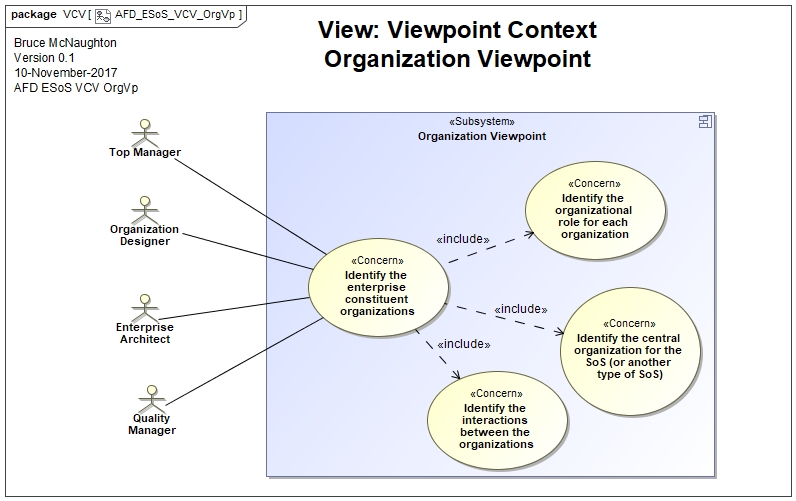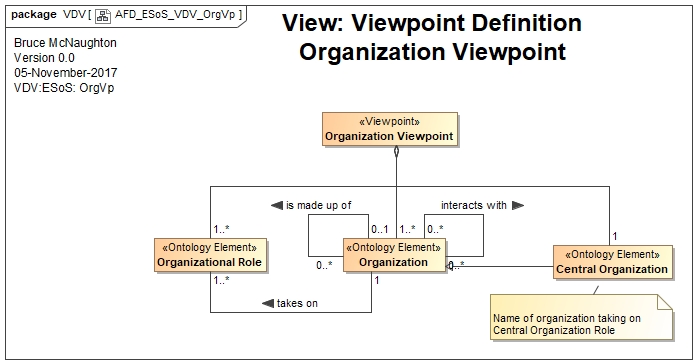Description
The Organization Viewpoint describes the approach to creating the Organization View for an Architecture Description.
The Organization Viewpoint provides the instructions to create a Value System Model of the entire Enterprise and the Organization Chart for the Organization taking on the Central Organization role. This provides and end to end view of the Supply Chain, the central organization and the channel partners to deliver products and services. The Organization Chart provides the organizations within the Central Organization.
This viewpoint ensures that is a consistent way to make informed decisions about allocating capabilities across the Value System and within the Central Organization.
Capability Models created in the Capability Viewpoint can also be referenced from the capability viewpoint to highlight core capabilities needed.
The Organization View is one of the dimensions of an Operating Model.
Rationale
- The Value System provides a holistic view of the how products and services are delivered to customers. This provides a basis for normal operations and how to handle disruptions.
- The Organization Chart for the Central Organization provides the ability to understand where capabilities interact along the value system.
- The Viewpoint allows for a modular approach to organization design and allocation of resources. See multi-dimensional organization design and the operating model dimensions.
- Establish a full value system set of capabilities necessary to achieve the Enterprise objectives.
Stakeholders and their Concerns

Ontology Concepts and System Descriptions
System Description: Enterprise, Organization, Organization Capability

Models
Steps to Create the View
- Identify the organizational roles needed to describe the value system.
- Identify the organizations that are needed to deliver products and services.
- Create the value system model.
- Create an Organization Chart for the Central Organization.
- Review the model and check alignment with the other views.(e.g. Capability View).
- Identify the set of capabilities needed across the full value system. This uses capability models at a higher level than a full value chain. The capability view adds the additional details for organizations.
Correspondences
CR01 Each Role is unique (Customer, Supplier, Central Organization, etc)
CR02 Where there are product lines or divisions, each product line or division may have their own Value Chain and Business Plan. These may be shown as separate Value System Models as they can be considered a separate enterprise. The other views consolidate across value streams. The organization should highlight these business units within the Central Organization.
Examples
These correspond to some of the operating models in Enterprise Architecture as Strategy.
Sources
- Corporate Governance: Principles, Policies and Practices, Bob Tricker
- Creating the Corporate Future, Russell Ackoff
- Designing Dynamic Organizations, Jay Galbraith and Dianne Downey and Amy Kates
- Enterprise Architecture as Strategy, Jeanne W. Ross and Peter Weill and David C. Robertson
- Leading Change, John P. Kotter
- Leading Organization Design, Gregory Kesler and Amy Kates
- Lean Thinking, James P. Womack and Daniel T. Jones
- Management: Tasks, Responsibilities and Practices, Peter Drucker
- Organization Design, Jay Galbraith
- Re-Creating the Corporation, Russell Ackoff
- Waltzing with the Elephant, Mark Toomey
Notes
This provides a way to see the enterprise as a multi-dimensional organization (See Galbraith and Ackoff). This provides a way to minimise disruption when changes are required.
The Organization Chart can also be prepared as a multi-dimensional organization chart.
See the various organizational designs in the Enterprise as a system of systems site.